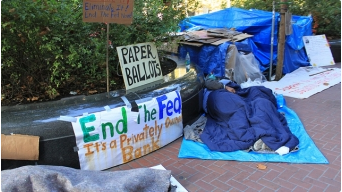Crossposted at PublicCEO.
Looking at the City of Oakland as a case study puts into sharpest relief the paradoxical impact of the Occupy Protests. The costs they impose on the city directly impact the 99% they claim to be protesting for.
The $3 million that Oakland has already been forced to spend as a result of the Occupation had to come from somewhere – taken from some budget in the form of some employee’s salary or some community’s service. Local governments do not have the luxury that so many others enjoy; where books are “balanced” with slights of hand or accounting gimmicks. In the world of local government, budgets must be balanced and cannot endure unsustainable spending habits on a whim.
 What does it mean when an Occupy encampment is established? Is it illegal? In most cases, yes. Is it inconsiderate? Maybe. Is it detrimental to the community? Absolutely.
What does it mean when an Occupy encampment is established? Is it illegal? In most cases, yes. Is it inconsiderate? Maybe. Is it detrimental to the community? Absolutely.
From a local government standpoint, the Occupy protesters have been draining resources and revenues for months. Although it costs the Occupiers nothing, for cities the bills for patrols, sweeps, arrests, incarcerations, repairs, and sanitizing former encampments is expensive. It’s now the exception that a community accommodates the protesters. Even San Francisco evicted the Occupy Protesters from their encampment.
In Los Angeles, a carefully orchestrated police sweep cleared the camps and avoided major confrontation. Such police action does not come cheap. In Oakland, the November Occupy Eviction that was marred by gas and violence involved police from a number of neighboring cities. The cost was between $300,000 and $500,000.
Already reeling from $3 million in damages by the Occupy Protesters, the City of Oakland had to fire 80 employees as part of their budget solution on Wednesday.
Not all of the cuts can be attributed to the Occupiers. Oakland also lost $28 million due to the end of redevelopment. However, it has to be asked: did everyone have to go?
How many people could have continued showing up for work had Oakland not been forced to spend that $3 million? Which jobs could have been saved? Which program didn’t have to be cut?
Each job lost, and person forced into unemployment, is just another reason why the Occupy Movement is bad for local government.
How do you explain to a victim of a crime that police officers aren’t available to respond because they are pre-occupied with un-occupying the protesters?
These are just another reason why the Occupy protesters should go home.
If that wasn’t enough, recognize that some involved with the Occupy Movement have and continue to subvert the original intention of the protests. These anarchists use the Occupy Protest to shield their sheer sadistic glee of mayhem. They are the ones who show up to a protest with crowbars, intent on breaking and entering into a publicly owned building, who topple a model of the city hall, who steal and burn and destroy.
They aren’t the Occupy Protesters. They aren’t the 99%, either. They are menaces in our communities and a drain on our local governments. And the 99%, and the Occupiers themselves, should turn on them and turn them in. Let them, as I’ve seen written recently, occupy a jail cell. And maybe, just maybe, if the world is truly a just place, it will be in Riverside County, where they’d have to pay the bill for their own incarceration. There are no free rides, even when the local governments are paying.
Take the politics out of the Occupy Protests. For it or against it, simply recognize the immense costs of the protests. It costs money. It costs people their jobs. It costs communities their services.
And the needless, pointless, and frivolous costs of the Occupiers should be cut by local governments before all others.

